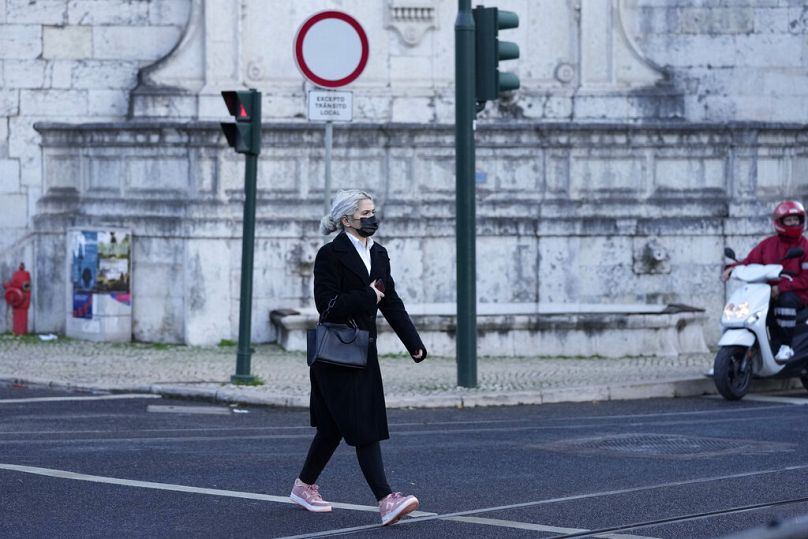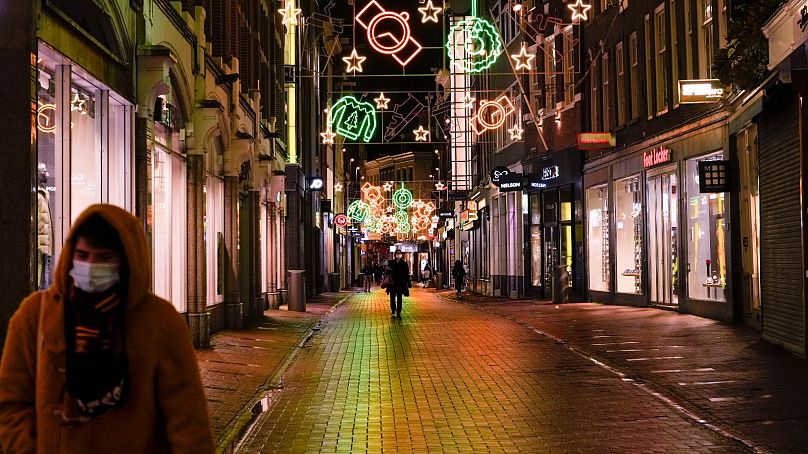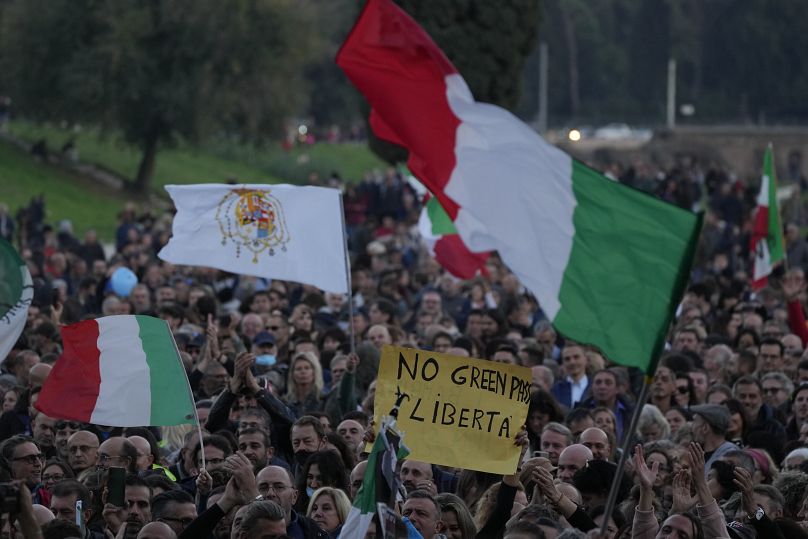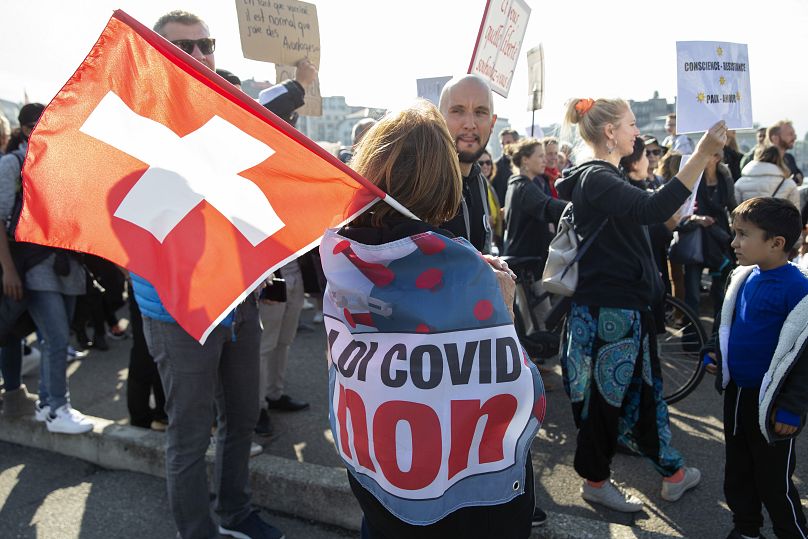COVID-19 cases are sweeping Europe once again — here is a breakdown of how each country has reacted to the surge.
Measures vary across the continent — from a national lockdown in Austria and move towards mandatory vaccination in Germany, to the United Kingdom where only light restrictions are in place.
Concerns over the Omicron new variant detected in South Africa have prompted many European countries to put curbs on travel.
109 cases of Omicron were recorded in the European Economic Area as of Friday at midday, according to the European Center for Disease Prevention and Control.
However, Delta remains by far the dominant force in Europe, accounting for the vast majority of new infections and putting increasing pressure on hospitals.
The World Health Organization warned in November that Europe and Central Asia could face another 700,000 COVID-19 deaths by March 1.
Here is a run-down of the latest situation in some of the European countries.
Germany
Outgoing Chancellor Angela Merkel on Saturday made what is likely her final appeal before leaving office next week for Germans to get vaccinated against COVID-19.
“Get vaccinated, no matter whether it’s a first vaccination or a booster,” Merkel said. “Every vaccination helps.”
She added that the new omicron variant “appears to be even more contagious than the previous ones.”
Her message came two days after federal and state leaders decided on a series of measures meant to break a wave of coronavirus infections.
The measures include excluding unvaccinated people across the country from nonessential stores, restaurants and sports and cultural venues. In a longer-term move, parliament will consider a general vaccine mandate.
At least 68.9% of Germans are fully vaccinated against the coronavirus, short of the government’s aim of a minimum 75% vaccination rate.
The national disease control center on Saturday reported 64,510 new daily cases and a 7-day infection rate of 442.7 new cases per 100,000 residents. Another 378 deaths in 24 hours brought Germany’s total in the pandemic to 102,946.
“Every one of them leaves behind families or friends, stunned, speechless and helpless,” Merkel said in her video message. “This is so bitter because it is avoidable. With the effective and safe vaccines, we have the key to this in our hands.”
Ireland
Ireland moved on Friday (December 3) to tighten restrictions still further, announcing that from next week nightclubs will close, and social distancing will be re-established in pubs, restaurants and hotels.
The measures will take effect on Tuesday (December 7) and run until at least January 9.
Taoiseach Micheál Martin described the risks of heading into the Christmas period without reducing social contacts as “just too high”.
Capacity in indoor and sports venues, where masks are already compulsory, will be limited to 50%. A health pass is already required for entry to leisure venues.
The measures come on top of restrictions the country announced last month due to high rates of infection that have put pressure on hospitals.
People have been told to work from home unless attending the workplace is “absolutely necessary”. Arrivals from overseas must have a negative test result in addition to being vaccinated or recovered from COVID-19.
Norway
At least 13 people in Norway’s capital have been infected with the omicron coronavirus variant at a company Christmas party, officials said on Friday.
“Our working hypothesis is that at least half of the 120 participants were infected with the Omicron variant during the party,” Preben Aavitsland, a senior physician at the Norwegian Institute of Public Health, told AFP.
“This makes this, for now, the largest Omicron outbreak outside South Africa,” he added
New national and regional restrictions took effect on Friday (December 3).
The strictest measures cover Oslo and the surrounding region. They include working from home when possible, a 100-person attendance limit at private indoor events in public places or rented venues, and restaurants and bars having to register customers.
The authorities recommend the use of face masks on public transportation and in shops and shopping malls.
Anyone entering Norway must be tested within 24 hours, either at the border, at a public test station, or by self-test. If a rapid test comes back positive, a traveler must take a PCR test within 24 hours.
Austria
Austria’s lockdown has officially been extended until December 11 as planned amid signs that the measures are helping to bring down a sky-high coronavirus infection rate.
Essential shops that were allowed to open until 9 pm, however, will have to close by 7 pm starting on Thursday (December 2).
The country issued the lockdown on Monday (November 22), becoming the first EU country to take such a measure in the face of the COVID-19 resurgence.
Conservative Chancellor Alexander Schallenberg has also said that vaccination will become compulsory from February 1.
Authorities in Austria said on November 17 that travelers would need to show a negative PCR test upon entering the country. Previously, results from the cheaper lateral flow tests were allowed.
Greece
Greek lawmakers approved mandatory COVID-19 vaccination for people over 60 in response to a surge in cases.
Around 17% of Greeks aged over 60 have not yet been vaccinated.
If they do not get the vaccine by 16 January, they risk being fined €100 for every month they remain unvaccinated.
Portugal
Portugal reintroduced tighter pandemic restrictions on Wednesday (December 1) to contain a new surge in infections.
Face masks have once again become mandatory and the country tightened control of its borders.
A digital certificate proving vaccination or recovery from COVID-19 is required to access restaurants, cinemas and hotels.
Portugal has a high vaccination rate with around 86% of its population fully vaccinated against the virus.
France
France is toughening its conditions of entry. From Saturday (December 4), all arrivals from non-EU countries — including the UK — will have to provide a negative COVID test carried out within the previous 48 hours, even if they have been vaccinated.
The country reported another 49,610 new daily cases on Wednesday (December 1), up from 47,177 the previous day. The average taken over a week has shot up by over 50%. Health Minister Olivier Véran has warned that the sanitary situation in the country “is worsening”.
From 15 January, all adults will need a booster jab at least seven months after being fully vaccinated in order to keep their health passes. From mid-December, people over the age of 65 will need one to have their health passes extended.
Some 76.8% of France’s 67.4 million people are fully vaccinated, according to the latest figures.
Spain
Several regions have introduced stricter measures for the unvaccinated ahead of the Christmas season, extending the use of the COVID-19 certificate to enter public places such as bars and restaurants.
More than 80% of the Spanish population is already immunized, but fears of the Omicron variant have triggered a vaccination drive.
Since mid-November, nearly 200,000 Spaniards who were reluctant to get the vaccine at first have now finally taken the step.
Hospitals are not overcrowded, but doctors are still urging the population to remain vigilant.
Spain registered almost 100,000 new cases in two weeks, but this is still far from a high risk of transmission.
Denmark
Denmark recorded a record number of new COVID-19 cases on Wednesday (December 1), with 5,120 new infections in the last 24 hours.
Denmark is offering COVID-19 booster jobs to people over the age of 18, the health authority said on November 26, stating that immunity was declining for people in younger age groups as well.
On November 12, Denmark reintroduced its digital pass as it declared COVID-19 “a socially critical disease” once again amid an increase in cases.
Until at least mid-December, a valid pass is mandatory in order to enter nightclubs or cafes or to be seated indoors in restaurants.
United Kingdom
Scientists in the UK have advised that all adults should now be included in the COVID-19 booster jab campaign in the wake of the spread of the Omicron variant.
The new variant is causing worry around the world due to the high number of mutations it has, which scientists warn could have implications for not only transmissibility but also vaccine effectiveness.
Wei Shen Lim, chairman of a UK government sub-committee on vaccinations, said at a press briefing on Monday that all adults aged 18-34 should now be included in the booster program.
Belgium
Belgium is to close nursery and primary schools a week early for the Christmas holidays, the government said on Friday (December 3). Children must wear masks from the age of six.
Prime Minister Alexander De Croo said 40% of intensive care beds were filled by COVID-19 patients and people were not getting the treatment they need, “a situation that cannot be tolerated”.
It’s the third week in a row that restrictions have been tightened.
The country has already closed nightclubs and required people to work from home as part of an effort to curb COVID-19 cases. The government issued new measures on November 26 including shutting bars and restaurants from 11 pm.
Events held indoors must be seated and private meetings, besides weddings and funerals, are banned.
De Croo said on November 25 that his country had recorded an uptick in coronavirus cases and hospitalizations far worse than feared, after reimposing tougher pandemic rules the previous week.
The surge exceeded “the most pessimistic curves” drawn by experts, he said.
Netherlands
A new round of restrictions entered into force over the last weekend of November, including the closure of all non-essential shops including bars and restaurants from 17:00 to 05:00.
Hospitality and cultural venues have to ensure people are seated 1.5m apart, which “means fewer people can be admitted to these locations,” the government said.
Amateurs sporting events are also not permitted between 17:00 and 05:00 with professional sports events allowed to proceed but with no spectator.
Czech Republic
A 30-day state of emergency came into effect on Friday (November 26) as the Czech Republic sees record-high COVID-19 cases.
As part of the government’s anti-COVID measures, all Christmas markets across the country are banned and people will not be allowed to drink alcohol in public places, health minister Adam Vojtech said. Bars, restaurants, nightclubs, discotheques and casinos have to close at 10 p.m.
The number of people at culture and sports events will be limited to 1,000 who are vaccinated or have recovered from COVID-19 All other public gatherings can be attended by up to 100 visitors, down from 1,000.
Slovakia
Slovakia declared a 90-day state of emergency and a two-week lockdown following a spike in COVID-19 cases that saw the country’s seven-day average of cases rise above 10,000.
The central European country is currently in the midst of the world’s fastest rise in infections, and the measures, which include closing all non-essential stores, as well as bars and restaurants, are meant to help the struggling healthcare system.
Just 45.3% of the 5.5 million population is fully vaccinated.
Italy
The Italian government on Wednesday (November 24) decided to exclude unvaccinated people from certain leisure activities in a bid to contain rising coronavirus infections and avoid financially crippling lockdowns.
Starting December 6, only people with proof of vaccination or of having recovered from COVID-19 can eat at indoor restaurants, go to the movies or attend sporting events. Having just a negative test result is no longer acceptable in what was dubbed a “reinforced” or super green pass.
A new government decree also made vaccinations mandatory for law enforcement, military, and all school employees, among others. Previously, vaccines were only required for health care workers.
Twenty towns in Italy’s South Tyrol province face harsher COVID-19 restrictions from Wednesday (November 24) with an 8 pm curfew due to high infections and low vaccinations.
On public transport, passengers must wear an FFP2 mask or equivalent.
Russia
Amid low vaccination rates and poor compliance with public health measures, more regions have made COVID-19 shots mandatory for people aged 60 and over in an effort to boost vaccine uptake and keep contagion and fatalities down.
Coronavirus infections in Russia have started to fall but daily deaths remain high.
There were more than 31,000 new infections reported on Tuesday (November 30) and around 1,195 deaths.
Cases surged in October amid low vaccination rates and lax public attitudes toward taking precautions. About 40% of Russia’s nearly 146 million people have been fully vaccinated, even though the country approved a domestically developed COVID-19 vaccine months before most of the world.
Sweden
The Swedish government has announced that from December 1 a health pass will be required to attend any event of more than 100 people.
The COVID pass — attesting that the holder has either been fully vaccinated, tested negative over the previous 72 hours, or recovered from the disease over the preceding six months — has so far only been used in Sweden for travel purposes.
The government also reversed its November 1 decision to stop testing fully vaccinated people.
Ukraine
From December 9, unvaccinated civil servants and social workers will be fired, the government said.
Ukrainian president Volodymyr Zelenskyy announced on November 16 that those who receive two jabs of the vaccine will be given a payment of 1,000 hryvnias, or about 33 euros in an attempt to alleviate vaccination reluctance.
Statistics on how many people received both doses vary greatly, with reports claiming that it stands anywhere between 20 and 28 percent.
Switzerland
Switzerland has moved to scrap an obligation to quarantine upon arrival in the country from Saturday (December 4), but is to tighten its testing requirements.
Quarantine had been imposed over fears of the Omicron variant, but the move is seen as redundant as the domestic transmission is already apparent. Instead, tests will be required before arrival, and again in the days afterward.
The move is seen as an important step towards saving the winter ski season.
Swiss voters approved by a clear margin the so-called ‘COVID-19 law’ in a referendum on November 28.
The legislation, which is already in force, includes a pandemic recovery package and the application of a controversial COVID certificate.
Like in many other countries in Europe, this health pass only lets people who have been vaccinated, recovered or tested negative attend public events and gatherings.
Bulgaria
Cases are beginning to decrease in Bulgaria after a massive surge in October but the vaccination rate is still quite low at just a quarter of the population.
There were 2,681 new cases reported on Wednesday (December 1) and 128 deaths.
The country has 6,470 people hospitalized with COVID-19 and 717 in intensive care units.
Romania
Like Bulgaria, Romania has found itself in the throes of a deadly spike in cases in October, but cases have now decreased significantly since the beginning of the month.
Croatia
Protesters gathered in Zagreb over the weekend over tighter COVID restrictions after the government announced plans to introduce mandatory COVID passes for government and public employees, including school teachers.
The nation of around four million people has one of the lowest vaccination rates in the European Union, with only 53 percent of the total receiving at least one jab, and only 57 percent of the 3.3 million adults fully immunized.
Latvia
From 15 December, people must present a COVID-19 vaccination or recovery certificate in order to show up to work.
People who are not vaccinated or who have not recovered from COVID-19 are allowed in grocery shops, pharmacies and other essential shops.




